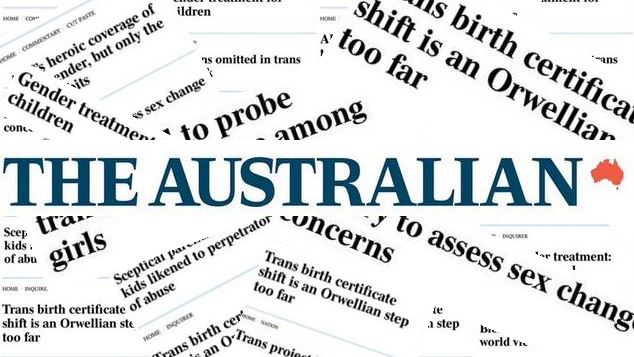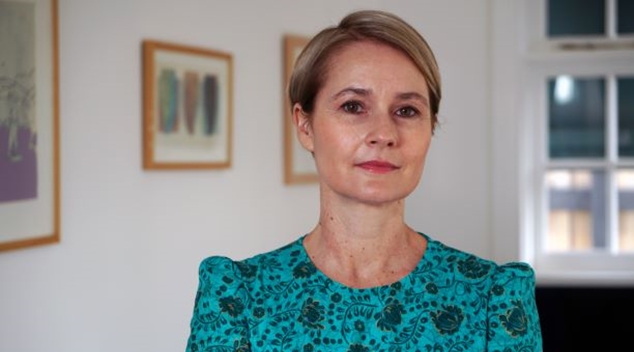
The Australian Press Council has delivered its adjudication on a complaint from well-known transgender health expert Dr Michelle Telfer finding that the national newspaper had breached reporting standards on several occasions.
The Press Council also ruled that many of the reports published by The Australian fell within the guidelines of acceptable reporting.
The council considered a complaint from Dr Telfer, the Head of Department of Adolescent Medicine at the Royal Children’s Hospital and Director of the Royal Children’s Hospital Gender Service (RCHGS), concerning 45 articles published in The Australian which appeared online and some which appeared in print.
Dr Telfer said she welcomed the finding, highlighting the importance of fair and balanced information being published about transgender youth.
“I welcome the outcome of my complaint to the Australian Press Council which was published today. It is vitally important that information published on trans youth is accurate, fair and balanced. The health and well-being of the trans community depends on it.” Dr Telfer told OUTinPerth.

The Royal Children’s Hospital, where the clinic managed by Dr Telfer is based also welcomed the ruling.
“The continued campaign has impacted Michelle, the Gender Service team, our patients and the transgender community. The APC adjudication confirms that media outlets have an obligation to deliver accurate, unbiased reporting on transgender issues.
“The Royal Children’s Hospital stands by Michelle, our Gender Service and its talented clinicians. We remain committed to their great work to improve the physical and mental health outcomes of children and adolescents who are trans or gender diverse.” the hospital said in a statement.
The 45 articles that the complaint drew attention to were published between 9th August 2019 and 29th June 2020. They includes both articles and opinion pieces published by the newspaper.
Almost all the pieces were written by Bernard Lane, The Australian’s roving editor and data journalist. One article was written by Jennifer Oriel and the remaining articles cited in the complaint were anonymous editorials.
The adjudication found some of the reports had breached General Principle 1 which requires publishers to take reasonable steps to ensure that factual material in news reports and elsewhere is accurate and not misleading and is distinguishable from other material such as opinion.
The Press Council said it was unable to make a judgement on elements of the reports concerning regret rates for hormone therapy, high rates of de-transition and social contagion in the area of transgender health, as there is an apparent conflict within the medical research.
The council also dismissed elements of the complaint in relation to a front page story on The Australian published on 17th August 2019. In the report the newspaper announced that the Royal Australian College of Physicians (RACP) would be conducting an inquiry into transgender health treatments in Australia, and the move had the backing of federal health minister Greg Hunt.
The RACP noted that they were only responding to correspondence that the minister had forwarded on to them, and conducting inquiries was not within their remit. The Press Council however found that the newspaper’s use of the description “national inquiry” was not inaccurate as the phrase can have “a wide range of meanings”
“While the Royal Australian College of Physicians (RACP) was not undertaking a statutory inquiry, the Council considers it was undertaking enquiries and is a national body. ” the adjudication says.
The Press Council did find however that The Australian had not met the expected standards in relation to reports that claimed that the Royal Australian and New Zealand College of Psychiatrists (RANZCP) had abandoned reliance on the Australian Standards of Care and Treatment Guidelines for Trans and Gender Diverse Children and Adolescents (ASOCTG). The council said the claim made by the newspaper was “not correct.”

The Press Council said when it came to concerns about fairness and balance of factual material over time, there is a relatively high threshold before a publication will be considered to have failed to take reasonable steps to present factual material with reasonable fairness and balance.
The adjudication said the focus on Dr Telefer was reasonable given her position as the head of the Royal Children’s Hospital Gender Clinic, and the newspaper had taken steps to try an achieve a measure of fairness and balance in an area of social uncertainty.
They noted that many in the medical community would not consider someone to be an expert in the field unless they worked specifically in transgender healthcare, but there is no requirement for a media organisation to rely only on comments from experts in the field.
The adjudication did however find that The Australian had not included the full information about the current treatment affirming standards of transgender health care in their reports.
Noting that gender affirming healthcare has been used for 20 years internationally and for 16 years in Australia, alongside aspects of the treatment have been authorised by the Family Court, and the affirming approach is supported by specialist doctors treating gender dysphoria as currently the best medical treatment, was largely not reported in the articles.
The Council considered that by repeatedly quoting the views of professionals from various fields of medicine and psychology that the treatment was experimental and harmful without explaining they are not medical specialists in the area, and linking the criticism so personally to Dr Telfer, The Australian failed to take reasonable steps to ensure fairness and balance.
The omission was ruled as a breach of General Principle 3 of the Council’s Standards of Practice which calls for information to be presented with reasonable fairness and balance, and for publications to ensure that writers’ expressions of opinion are not based on significantly inaccurate factual material or omission of key facts
 .
.
The adjudication also found The Australian had breached Principle 6 of the Standards of Practice which requires publications to take reasonable steps to avoid causing or contributing materially to substantial distress or prejudice, or a substantial risk to health or safety, unless sufficiently in the public interest.
The Press Council said “the articles were likely to and did cause substantial distress” to Dr Telfer.
“There is undoubted public interest in a journalistic analysis of the debate on the many issues connected with transgender issues and people, and associated healthcare.” the adjudication states, “However, the public interest did not justify the extent of references to the complainant in so many of the articles or implying that the healthcare practised at the RCHGS is out of step with mainstream medical opinion.”
The report found that the newspaper had given Dr Telfer the opportunity to comment on each of their stories and also offered her the opportunity to write an opinion piece in response to their reports. While the offers were rejected, it found that there had been no breach of Principle 4 of the standards, which requires a right of reply be given.
The report also noted that while there was no requirement for the newspaper to list support services available for people who are transgender, it accepts that a number of the articles would have been read by a vulnerable section of the community and these people might have found them to be challenging their experience of life. The Press Council said including sources of assistance “might have been a prudent step”.
Response from The Australian
OUTinPerth approached The Australian for comment on this article but we did not receive a response. The newspaper did publish an editorial on Friday addressing the adjudication.
“The question is whether the council’s stance will further constrain legitimate scrutiny of gender clinics and stand in the way of good journalistic practice and free speech.” the newspaper said.
“It can be argued the APC has been swayed unduly by a concerted campaign by activists not interested in this issue receiving the public scrutiny it deserves. We contend that closing debate in this way will have a chilling effect on free speech.”
The newspaper said parts of the judgement from the Press Council were “wrongheaded”, and that a guidance document on reporting LGBT related issues that was released in 2019 forces journalists to use “activist lists of language taboos”
“The APC adjudication is the first real test of its new guide for journalists covering LGBT issues. That 2019 guide mirrors the “affirmative” world view of the gender clinics.” the newspaper said.
“It is possible to conclude that the complaint made to the APC is another example of the cancel culture tactics used to stifle debate.” the newspaper said
“We will not shy away from uncomfortable topics that deserve attention. Our loyalties will always reside with our readers and our dedication to seeking the truth. We will never stop asking questions that hold those in positions of authority to account. This is particularly so when the health and wellbeing of vulnerable children are at stake.”
Graeme Watson
Do you need some support?
If you are struggling with anxiety or depression, support and counselling are available from:
QLife: 1800 184 527 / qlife.org.au (Webchat 3pm – midnight)
QLife are a counselling and referral service for LGBTQIA+ people.
DISCHARGED: 9364 6909 / waamh.org.au / wearedischarged@gmail.com
Discharged is a trans-led support service with peer support groups for trans and gender diverse folks.
Lifeline: 13 11 14 / lifeline.org.au
Beyondblue: 1300 22 4636 / www.beyondblue.org.au
You can support our work by subscribing to our Patreon
or contributing to our GoFundMe campaign.





